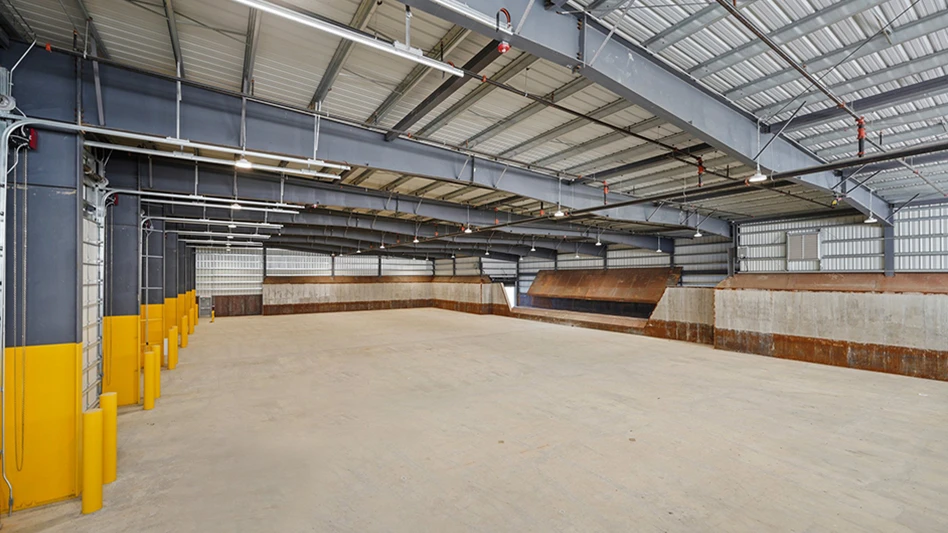
Photo courtesy of Casella Waste Systems Inc.
Regional solid waste, recycling and resource management services company Casella Waste Systems Inc., Rutland, Vermont, recently opened the doors of its newly renovated Charlestown, Massachusetts, material recovery facility (MRF). The company says the facility upgrade is complete with state-of-the-art equipment aimed to help increase throughput, improve end-product quality and enhance safety.
The reopening event, held June 9, included remarks from Massachusetts State Rep. Dan Ryan, Sen. Sal DiDomenico and Boston’s Green New Deal Director Oliver Sellers-Garcia.
RELATED: Setting up for success | Casella acquires assets of Consolidated Waste Services
The company says its Charlestown MRF is one of the largest recycling facilities in the country and accepts materials from many customers and communities throughout Massachusetts and the Greater Boston area. Casella Waste invested approximately $20 million as part of the facility’s upgrade.
“Since opening our first recycling facility in 1977, there has been a significant amount of innovation, technology and change, and we are proud to remain a leader in bringing that innovation to the marketplace,” Casella Chairman and CEO John W. Casella says. “Today is another important milestone in our pursuit of becoming an even more sustainable business while serving our customers in a way that helps them meet their sustainability goals.”
Upgrades to the facility include advanced robotics and artificial intelligence technology provided by Plessisville, Quebec-based Machinex Industries Inc. The enhancements incorporate more than a dozen new elements for sorting material, including the SamurAI sorting robot.
During a session centered on MRF upgrades at the WasteExpo 2023 convention in New Orleans in early May, Casella Waste Vice President of Resource Solutions Bob Cappadona said the renovated Charlestown facility will be able to process about 200,000 tons of recyclables per year or 50 tons per hour. Previously, the MRF had a processing capacity of 40 tons per hour.
“The Charlestown MRF consistently ranks among the top recycling facilities in the country in terms of tons processed annually,” Machinex Eastern Region Sales Manager Rusty Angel says. “Our established partnership from past projects, built on mutual trust and shared values, has laid a solid foundation for success. The business philosophies between Machinex and Casella are very similar, and our goals for the project aligned perfectly, a testament to the strength of our longstanding relationship.”
According to Casella Waste, the facility was previously converted to a single-stream MRF in 2009 and has processed nearly 3 million tons of recyclables since then. The upgrades come on the heels of more than $30 million in investments by Casella Waste in its resource solutions operations over the past two years.
“We’re thrilled to continue to grow our operations here in the city of Boston and the Commonwealth of Massachusetts,” Casella says. “With these upgrades, we continue to become more efficient, produce cleaner material and help to move forward the concept of a circular economy. While our sustainability journey is not complete, this is a significant step along that path.”
In 2005, Casella Waste joined the EPA Climate Leaders as a charter member, and in 2012 the company was awarded the EPA’s Climate Leadership Award for Excellence in Greenhouse Gas Emissions after reducing its carbon footprint by more than 45 percent from 2005 through 2010. Today, the company estimates that for every metric ton of greenhouse gas it emits through its operations, it prevents 4.8 metric tons of those emissions in society through the recycling, renewable energy and carbon sequestration services it provides.
Get curated news on YOUR industry.
Enter your email to receive our newsletters.Latest from Waste Today
- ReMA board to consider changes to residential dual-, single-stream MRF specifications
- Miller Environmental Group Inc. appoints CEO
- DPI acquires Concept Plastics Co.
- Laurel Mountain Capital announces investment in 5280 Waste Solutions
- Cielo investor requests annual meeting
- WIH Resource Group celebrates 20th anniversary
- NWRA: NIOSH cuts a step in the wrong direction
- Valicor Environmental services acquires Affordable Waste Management





